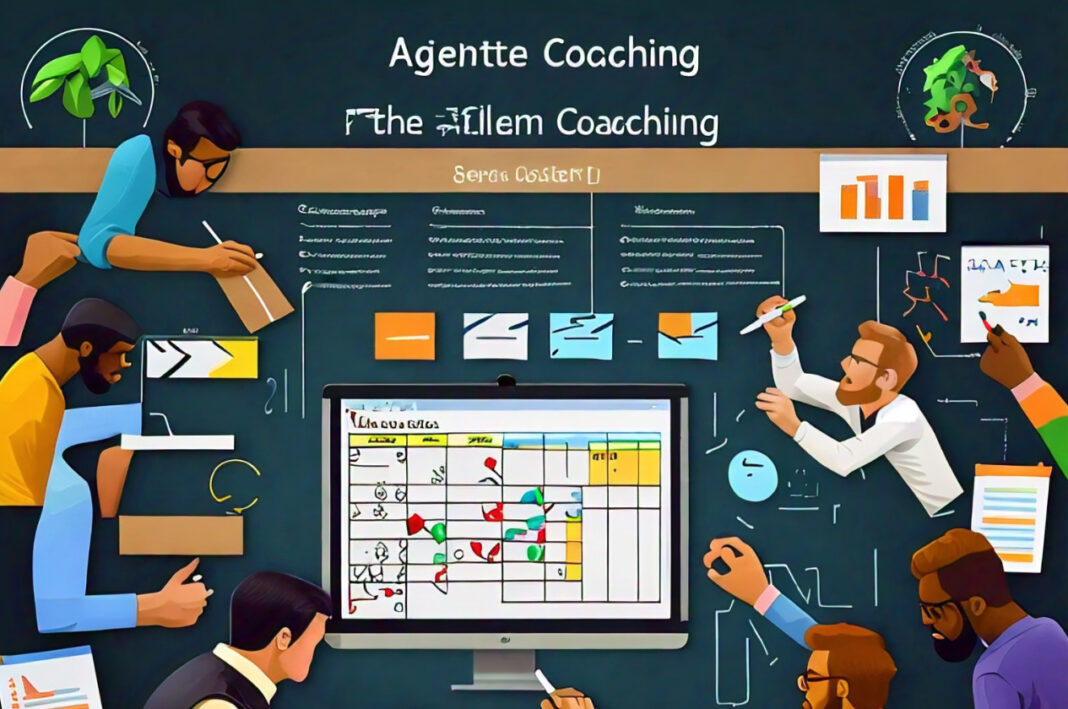The dimension of Agile coaching has become an integral part of successfully adopting and implementing Agile methodologies. Agile coaches play a vital role in taking teams and organizations
through their Agile journey toward the adoption of principles, practices, and culture.

This all-inclusive guide explores the job roles/ responsibilities of Agile coaches, details the skills and competencies, and spells out the effective coaching guide to drive successful Agile transformation.
1. Definition of Agile Coaching
Agile coaching is the practice that guides individuals, teams, and organizations in the effective adoption
and implementation of Agile methodologies. It facilitates teams to understand and apply Agile
principles and practices by ensuring a culture of continuous improvement to remove impediments
and address challenges associated with Agile transformations. It also serves as a means of
mentoring, facilitating, and empowering teams to achieve higher levels of performance and
effectiveness.
2. How Important Is Agile Coaching in an Organization?
Essential Agile coaching includes:
Agile Adoption—In Agile coaching, there is a big emphasis on understanding responsive
methodologies by the teams and organizations for effective implementation to result in improved
performances.
Team Performance—Coaching enhances processes, communication, and collaboration with the
team to help ramp up performance and productivity.

- Supports Continuous Improvement. The coach helps in establishing a continuous
improvement culture by encouraging the team to reflect not only on the practices that went well but
also on which required while learning from this experience and the subsequent way of working
adapting. - Overcomes Challenges: Coaches help in overcoming the varied challenges and roadblocks in
the process of transformation to Agile.
Key Roles of Agile Coaches
1. Mentor
Role: They are mentors who offer advice, support, and guidance to team members or the team
in general. They share insights and experiences with their team members for they to understand
Agile principles, practices, and roles.
Responsibilities:
- Knowledge Sharing: Share the skills and knowledge on Agile methodologies – Scrum, Kanban,
Lean, and others. - Skill Development: Help team members mainly develop related skills like facilitation,
estimation, and backlog management. - Career Guidance: Give career advice and support ‘people’ moving forward in the role of Agile
or moving forward in the Agile career path.
Skills Required:
- Deep Agile Knowledge: Full grasp of Agile methodologies and practices
- Communication Skills: One should be able to bring out complex concepts in a very
understandable and clear way. - Empathy: Ability to sense individual team member’s needs and concerns.
**2. Facilitator **
Role: Agile coaches facilitate the effective and efficient execution of Agile ceremonies, meetings
and workshops to help teams have productive conversations, make decisions, and meet their
objectives.
Responsibilities:
- Ceremony Facilitation: Facilitate Agile ceremonies such as daily stand-ups, sprint planning, and
so on. - Meeting Management: Drive structured, time-boxed meetings to meet the objectives or run
open-ended meetings for adaptive objectives. - Conflict Resolution: Functions as a moderator between two disagreeing parties via discussion,
thus keeping positive spirits alive.
Skills Required:
- **Facilitation Techniques: ** Proficiency and experience using the most common facilitation
techniques. - Conflict Resolution: Have the ability to manage and resolve conflicts.
- Organizational Skills: Must be strong enough to handle meeting logistics, agendas, and time
effectively.
3. Coach
Role: The Agile coach is the coach who closely associates with the team to elevate its practice
and process in Agile. They are meant to give feedback, advice, and support that will elevate the
team’s performance and, in an efficient manner, assimilate Agile values.
Responsibilities:
- Process Improvement: Help the teams further strengthen their Agile processes, including
sprint planning, daily stand-ups, and retrospectives. - Performance Coaching: Give feedback to and support individuals and teams to enhance their
performance and be of value. - Problem Resolution: Assist teams in surfacing and resolving problems—or dysfunctional
conditions—hindering effective performance at an Agile level.
Competencies Needed:
- Coaching Skills: Ability to apply different coaching skills, such as active listening, questioning,
and feedback. - Problem Solving: Capability of identifying and solving process-related problems and issues.
- Patience and Persistence: Ability to support and guide teams in the process of change and
improvement.
4. Change Agent
Role: Agile coaches drive and support organizational change initiatives toward the Agile adoption
and transformation and help make the organization’s culture, structure, and processes become
compatible with Agile.
Responsibilities
Change management—help and guide organizations, including process, role, and cultural change,
adopt and implement the Agile transformation.
Cultural change—foster a culture of collaboration, transparency, and continuous improvement.
- Stakeholder Engagement: Will engage with key stakeholders adequately in a bid to gain their
support concerning Agile initiatives. Will address any concerns or resistance coming from them.
Skills Required: - Change Management: Extensive knowledge in the field of change management principles and
practices. - Cultural Awareness: Awareness in the culture of organizations and driving cultural changes.
- Stakeholder Management: Ability to engage and influence stakeholders at all levels of the
organization.
Competencies of an Agile Coach
1. Agile Expertise
Agile coaches need to have in-depth knowledge and practice skills regarding Agile methodologies.
This means that the responders deal with different Agile frameworks, practices, and principles
involving competences in the following areas:
Frameworks and Practices: Agile frameworks and practices literacy including Scrum roles, events,
and artifacts.
Continuous Improvement: Principles and techniques fostering continuous improvement culture.
- Agile Metrics: Understanding of Agile metrics and how to drive performance and
improvement using them.
2. Facilitation Skills
Being a good facilitator forms one of the prime competencies for an Agile coach. It includes the
following:
- Meeting Facilitation: Capability to ensure Agile ceremonies, and meetings are done in a
valuable, well-organized, and timely manner. - Workshop Design: Capability to design and lead workshops and training sessions.
- Conflict Resolution: Capability to mediate through conflicts and facilitate the parties’ ability to
reconcile and join shared agreements.
3. Coaching Techniques
Agile coaches need to adopt and master various coaching techniques that help to develop and
support the performance of teams. Some of them include:
Active listening: ability to listen actively and empathetically to team members
Delivery of feedback: skill in providing active feedback and guidance
Questioning techniques: use of questioning techniques that promote reflection and learning growth
of their teams
Good communication skills
Clean communication skills are very vital to Agile coaches and may include:
- Verbal Communication: Ability to articulate and share information coherently and clearly.
- Written Communication: Share ideas and information through the written word in clear and
coherent forms. - Interpersonal Communication: Develop and build positive relationships; communicate and
interact efficiently and effectively with team members and stakeholders.
5. Organizational and Planning Skills
Agile Coaches should be organized, and he/she must be capable of planning relating to different
domains of their job. They should be able to showcase the following abilities:
- Time Management: Ability to manage time and priorities effectively.
▪ Event Planning: Planning and executing Agile ceremonies, workshops, and training settings.
▪ Documentation: Maintain and organize related documentation or records.
Agile Coaching Strategies
1. Building Trust and Relationships
An agile manager has to build trust and sound relationships with his team members. The
following can be utilized for doing the same :
▪ Active Engagement: Engage the team members by continually interacting with them and
providing feedback.
▪ Empathy: Show understanding and empathy towards the challenges and concerns of the team
members.
- Consistency: Be consistent in your dealings or relationships. Only then will you be taken
seriously and will be able to win people’s trust.
2. ENCOURAGING COLLABORATION AND COMMUNICATION
One of the most crucial aspects or areas of Agile teams is that of encouraging collaboration and
communication. Here is how one can foster this:
- Collaboration Tools: Promote the use of proper collaboration tools that help in proper
communication and teamwork. - Team Building: Create relationship building and greater collaboration opportunities.
- Open Communication: Inter-team communication should be open and transparent.
Continuous improvement is one of the tenets of Agile. Strategies to embed this into the culture
are as follows:
- Frequent Retrospectives: Regularly hold retrospectives to reflect on practices and seek ways to
improve. - Experimentation and Innovation: There has to be room for experimentation and innovation
leading toward continuous improvement. - Feedback Mechanism: This means to put in place a feedback mechanism and helical feedback
for seeking any changes.
4. Supporting Change Management
Effective change management is crucial for Agile transformations. Strategies include:
- Stakeholder Engagement: Active engagement with stakeholders is required to elicit buy-in in
the Agile initiatives and manage resistance. - Clear Communication: Clear presentation of vision, goals, and benefits of Agile
transformations.
-** Training and Support**: Training and support to help teams adjust to new Agile practices and
processes.
5. Measurement and Monitoring Progress
It involves checking the effectiveness of Agile practices through measurement and monitoring to
identify areas that could benefit from improvement. Some of those strategies include:
- Agile Metrics: Leverage Agile metrics such as Velocity, Cycle Time, and Lead Time to track
progress and performance. - Performance Review: An opportunity is given for scheduling continuous performance reviews
on individual and overall team performance. - Continuous Feedback: Though majorly through continuous feedback, it helps teams stay on
track, and if meandering, get back to the mettlesome path.
Case Studies
1. Case Study: Agile Transformation in a Software Company
The Agile Transformation of a software company was facilitated by a coach. The coach did the
following:
Facilitated Workshops: He carried out workshops to sensitize their teams about Agile practices and
principles.
Team Development Support: Collaborative engagement with teams in the improvement of their
practices while driving performance levels higher.
Change Management: Assistance in change management of culture shifts and managing resistance.
This brought forth an experience in which team members started collaborating, increased
productivity, led to customer satisfaction, and more.
- Case Study: Scaling Agile in a Large Organization
A large organization would want to perform scaling of Agile practices amongst several
different teams. The services of an Agile coach were needed for the following reasons:
Align teams – ensuring that the Agile principles and practices are in place for the teams, through
coaching and training.
Facilitate coordination – ensuring and facilitating coordination amongst different teams in Agile
practices.
Drive continuous improvement should serve to foster a culture of continuous
improvement and innovation.
The scaling effort led to considerable improvements in coordination, streamlined processes, and
completion of the delivery of complex projects.
Conclusion
Agile coaching plays a vital role in driving and implementing success regarding the Agile
methodologies. Agile coaches have to play multiple roles in creating the path of the teams and
organizations in their Agile transformational ways. The roles include Mentor, Facilitator, Coach,
and Change Agent. Every role is significant. Key Areas of Responsibility are:
– Mentoring: Guiding teams or individuals.
- Facilitate: Being able to ensure Agile ceremonies and meetings are effectively facilitated.
- Coach: Support teams in their shift to better Agile practices and performance.
- Drive Change: Lead and support the drive for organizational change related to Agile.
Agile coaches are effective only if they have a combination of qualifications, which means different types of competencies should be met: Agile knowledge, basic experience in conducting agile coach groups, coaching approach, communication skills, and organizational competencies. Agile coaches help intelligent applications move forward and adopt a variety of approaches to drive transformations and make small organisms reach their fullest potential by building trusting relationships, promoting cooperation for the team, cultivating continuous improvement and change management, and measuring progress.
As Agile practices continue to develop with the wide acceptance of Agile methodologies, the role of Agile coaches will continue to be very important in guiding teams through the complexities of Agile adoption and ensuring success by delivering high-quality products and services.






